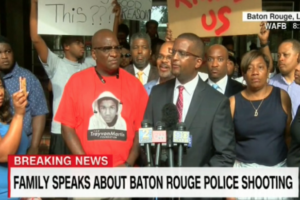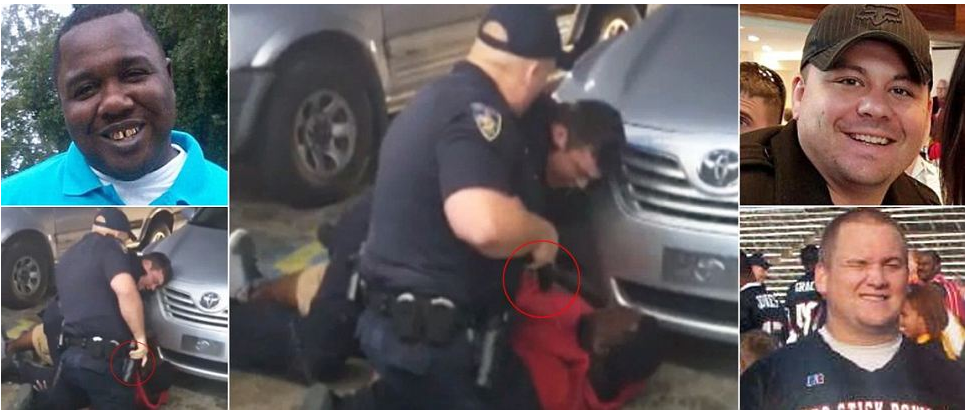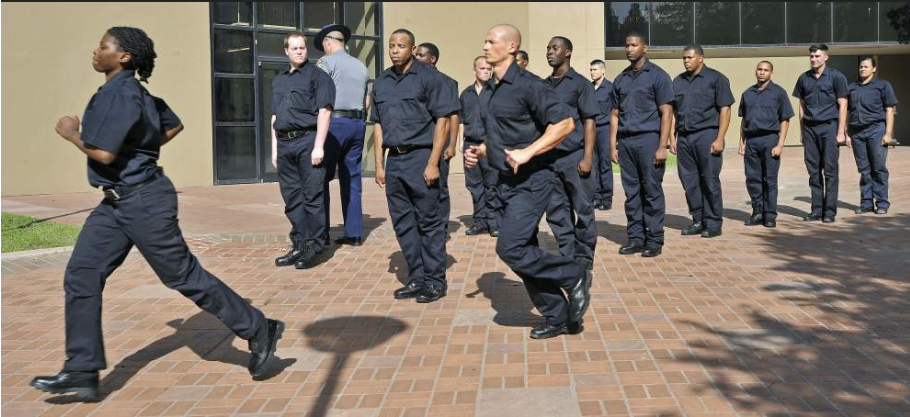The U.S. Justice Department opened a civil rights investigation Wednesday into the videotaped police killing of a black man who authorities say had a gun as he wrestled with two white officers on the pavement outside a convenience store.
Alton Sterling, 37, was confronted by police on Tuesday after an anonymous caller said he had threatened someone with a gun outside the store, where he was selling homemade CDs, authorities said.
In a cellphone video taken by a community activist and posted online, the two officers pinned Sterling to the ground, someone yelled, ‘He’s got a gun! Gun!’ and gunfire erupted moments later.
(Associated Press, July 6, 2016)
I’ve seen the video. And, like the infamous Eric Garner video, it shows Alton Sterling resisting lawful police commands pursuant to an arrest.
Of course, black activists will blame a trigger-happy cop without mentioning Sterling’s role in triggering his own death. And, as it was in the killing of Michael Brown, his defenders will blithely ignore the crime Sterling allegedly perpetrated, which caused someone to call the police in the first place.
But the video shows enough for me to assert that the Department of Justice (DOJ) will be hard-pressed to file charges for a clear violation of Sterling’s civil rights.
Those who took to the streets to avenge Trayvon’s death will not see this DOJ decision as justice served. I am all too mindful that they are the same protesters/rioters who took to the streets to avenge the deaths of Michael Brown and Eric Garner.
But this Zimmerman decision should temper their equally restive demands for the DOJ to file charges against White officers Wilson and Pantaleo – who killed Brown and Garner, respectively. After all, even a civil rights agitator like Rev. Al Sharpton must concede that, if the facts in the Zimmerman case ‘did not meet the high standard for a federal hate crime prosecution,’ the facts in these two other cases don’t stand a snowball’s chance in Hell of meeting it.
(“DOJ: No Charges Warranted in Zimmerman Case,” The iPINIONS Journal, February 25, 2015)
Here, the initial shot seems justified. But, after discovering all facts and circumstances, the subsequent three or four shots might amount to use of excessive force….
Whatever the case, I feel obliged to reiterate the following life-saving admonition from “Killing of Michael Brown: as much about Resisting Arrest as Police Brutality (only against Black Men?),” August 12, 2014.
___________________
Not every fatal shooting by the police of an unarmed man is a case of police brutality. We’ve all seen far too many incidents of people resisting arrest – even wresting away a policeman’s gun and killing him – just because they fear being questioned or arrested … even for something as simple as petty theft.
Indeed, you’d be hard-pressed to cite a case that resulted in fatality, where the victim followed the few general rules we should all follow when dealing with the police. Those rules, which form the acronym “Dodge” (as in bullets), are:
- Do not run.
- Obey commands. (Wait for the police to explain why you’re being stopped before politely posing any objections, concerns, or questions you may have.)
- Do not resist being frisked or handcuffed.
- Get the encounter on video. (Wait for the police to approach and make clear that you’d like to reach for your phone; i.e., avoid any sudden move that might make some trigger-happy cop’s day.)
- End the encounter civilly. (Not only might this spare another black man a racial-profiling stop (e.g., for DWB), it might make that cop less trigger happy during his next encounter with the next black man.)
___________________
Number 4 is particularly noteworthy given the critical role smartphone videos play in encounters with the police these days.
This will likely put both you and the policeman on your Ps and Qs (doubly so if he’s wearing a body camera); more importantly, it will ease suspicions and fears, on both sides, and lessen the likelihood of these encounters turning hostile.
Incidentally, it speaks volumes about this phenomenon of white cops shooting black men that you’d be hard-pressed to find a case where a white female cop was implicated. I am also acutely mindful that following these rules to the T is no guarantee against police brutality, or worse. But there’s no denying that doing so gives you the best possible chance of surviving potentially deadly encounters with the police.
 That said, too many black activists always seem more interested in political grandstanding than saving lives. If this were not so, they would spend more time admonishing black men against resisting arrest, while they’re alive, than fueling riots and pleading to the DOJ, after they’re dead.
That said, too many black activists always seem more interested in political grandstanding than saving lives. If this were not so, they would spend more time admonishing black men against resisting arrest, while they’re alive, than fueling riots and pleading to the DOJ, after they’re dead.
Not to mention the insult they cause to the real martyrs for civil rights by treating black men who resist arrest as such.
Incidentally, it is noteworthy that Baton Rouge, Louisiana, has been under a decades-old DOJ mandate to diversify its police department. And it is making commendable progress:
At the beginning of the current academy, the 81st, which began in late April, 41 percent of the recruits were white, 48 percent were black and 11 percent were another race. In the 80th academy, which began last June, the recruits were about one-third white and two-thirds black, according to Police Department data.
(Louisiana Advocate, May 22, 2015)
The DOJ has either secured consent decrees or issued mandates for other, mostly white police departments, which serve mostly black communities, to do the same. Notably, Ferguson, Missouri, where white cop Darren Wilson killed black teenager Michael Brown, is one of them.
I should also clarify that nothing I’ve ever written about these cases should imply any belief that white cops are licensed to kill black men who resist arrest.
To the contrary, in “Clarion Call for Body Cameras to Check Bad Cops,” April 14, 2015, I cited the killing of Walter Scott in North Charleston, South Carolina, and Eric Harris in Tulsa, Oklahoma, as two of far too many examples where similar shootings were wholly unjustified. Sure enough, the cop in the former case is awaiting trial in the fall for murder; the cop in the latter case was sentenced last month to the maximum four years in prison for second-degree manslaughter. But these prosecutions do not mitigate the fact that resisting arrest is always like playing Russian roulette….
Meanwhile, it’s only a matter of time before lawyers extract millions from the city of Baton Rouge to compensate Sterling’s family for his death. You might think this provides a deadly incentive for black men to keep resisting arrest. But I couldn’t possibly comment.
Related commentaries:
DOJ: Zimmerman…
Body cameras…
* This commentary was originally published yesterday, Wednesday, at 3:43 p.m.

